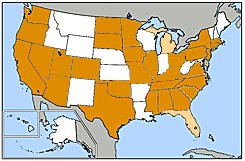Denver, CO
Left… left…left, right, left!
That’s what a typical day looks like for most adolescents in American schools. About 4 out of 5 classes focus on the brain’s left hemisphere, and one might focus on the right. “That art class is all some kids have to look forward to!” administrators say. “It’s what keeps those kids in school!”
So we’re asking kids to trudge through five or six hours of hell so they can have 45 minutes of creative time? I don’t think I’d last 12 years if I was one of “those kids,” either!
The responsibility falls upon each of us (“core” and “exploratory” teachers) to make every class period enjoyable, engaging and creative. Students need to be using both sides of their brains all day long to analyze and synthesize, to research and create. They’ll only be half engaged, half motivated, half alive if we continue to teach to half of their brains.

But arts teachers can fall victim to this as well. I was a pretty good musician when I was younger, but I was a left-brained musician. I could play the notes, and play them with accuracy and some expression. I was very good at analyzing and interpreting the mathematical formulas on the sheet of music, and very nice melodies emanated from the piano that I commanded.
But they weren’t my melodies. I wasn’t my music. Not until later, after learning a bit of guitar, did I really start to explore on my own and create my own music. My left-brain musical training helped me, but it wasn’t complete without my right brain creating something new with it. My hemispheres had to work in concert to produce music that was truly meaningful to me.
Obviously, playing in a band or orchestra at school has benefits that extend well beyond the musical values we hear in a performance: teamwork, dedication, intense focus. These are essential skills in the 21st century world. But a great music program must go beyond playing someone else’s music, and develop musicians who take risks, improvise and create. A great science program should do the same. Or art, math, social science, physical education, language, or any program.
We need people who can march in time and march to the beat of their own drum. Right…right…right, left, right! will also get you there.









No comments:
Post a Comment
Feel free to question, disagree, challenge, or make suggestions! I'm a big boy. I can take it.